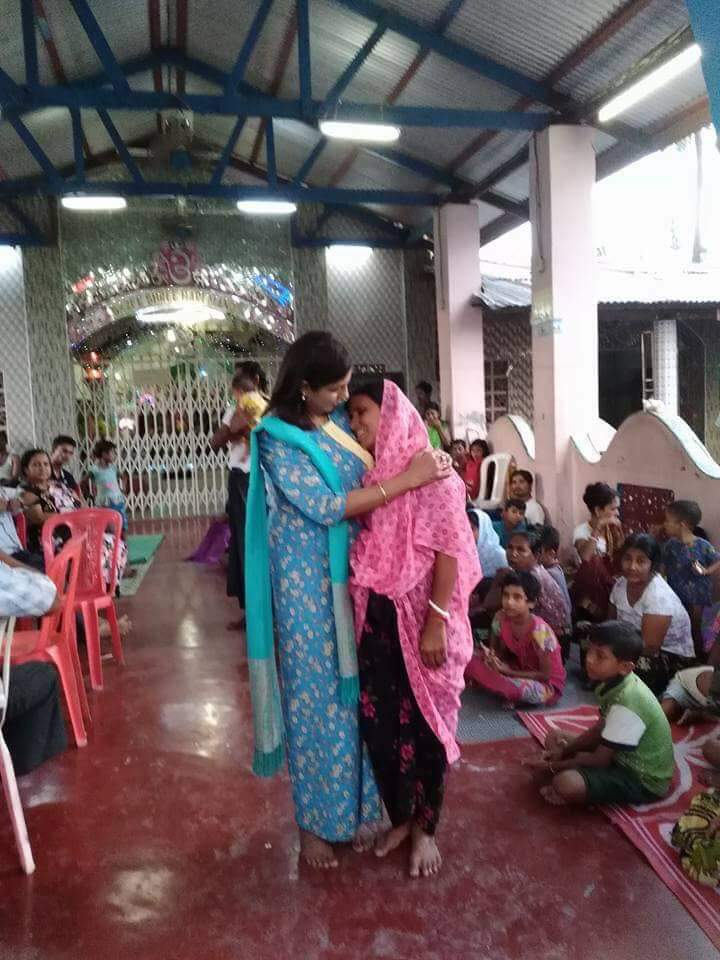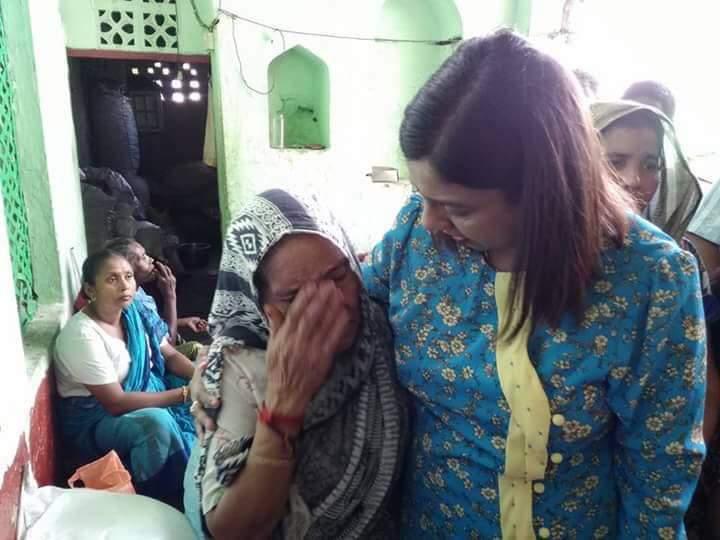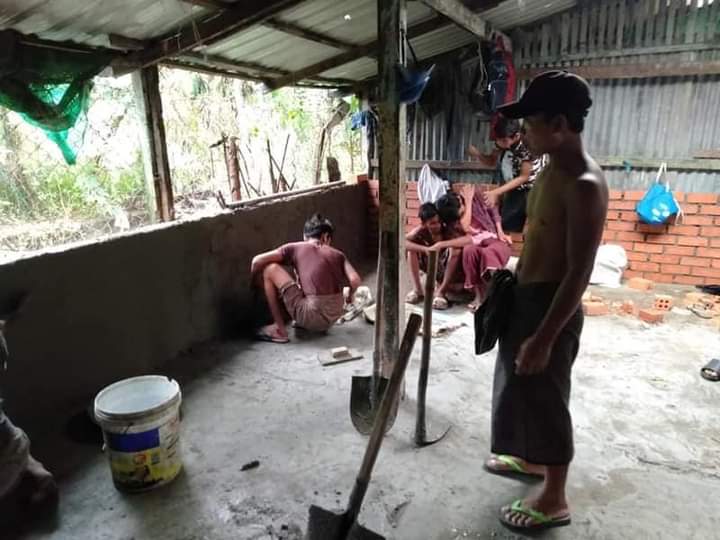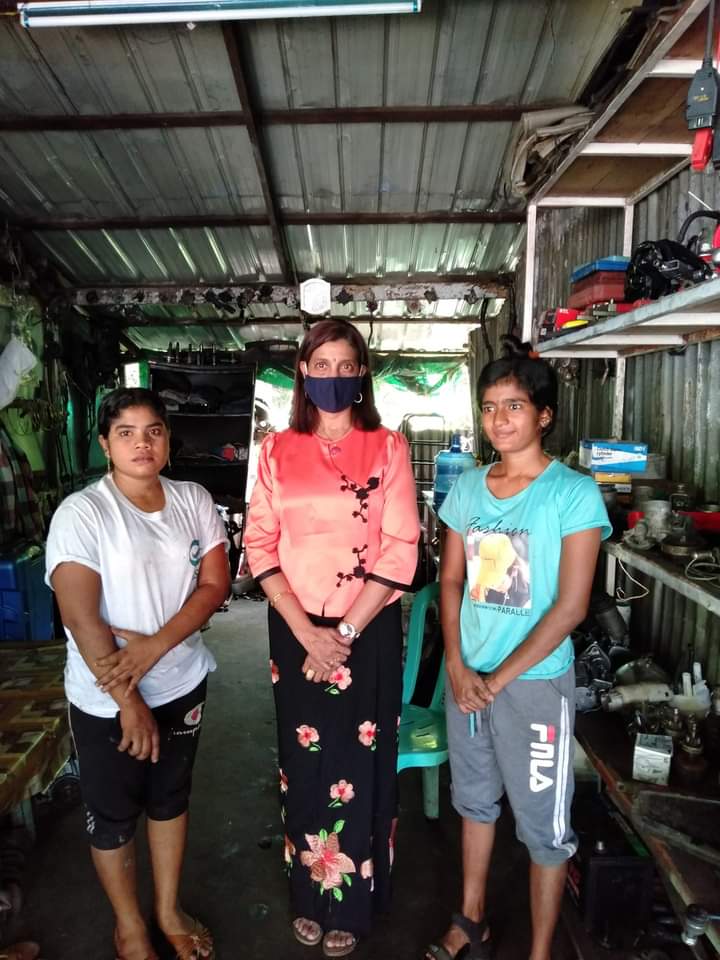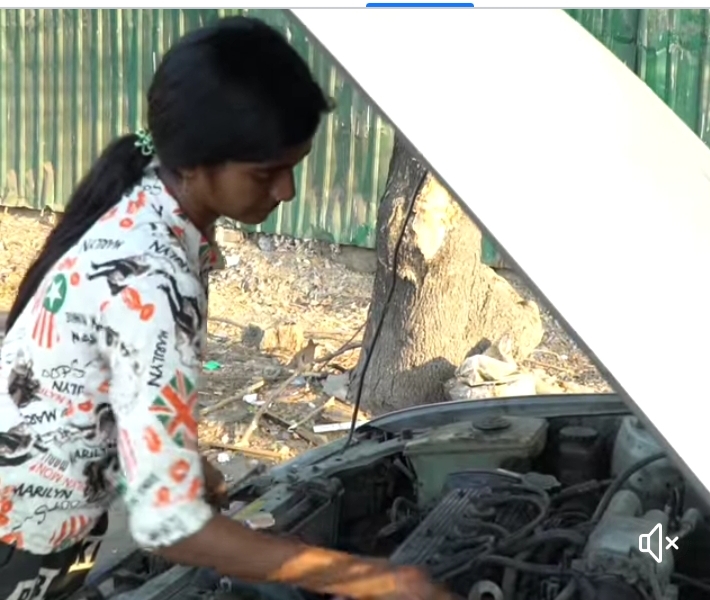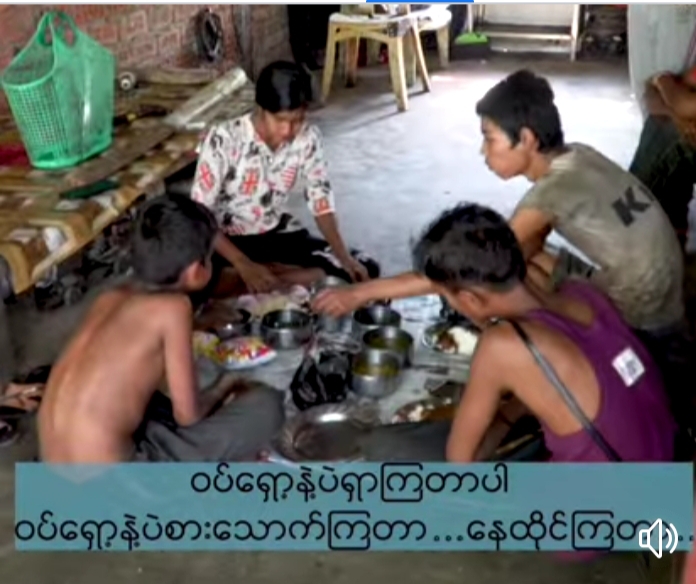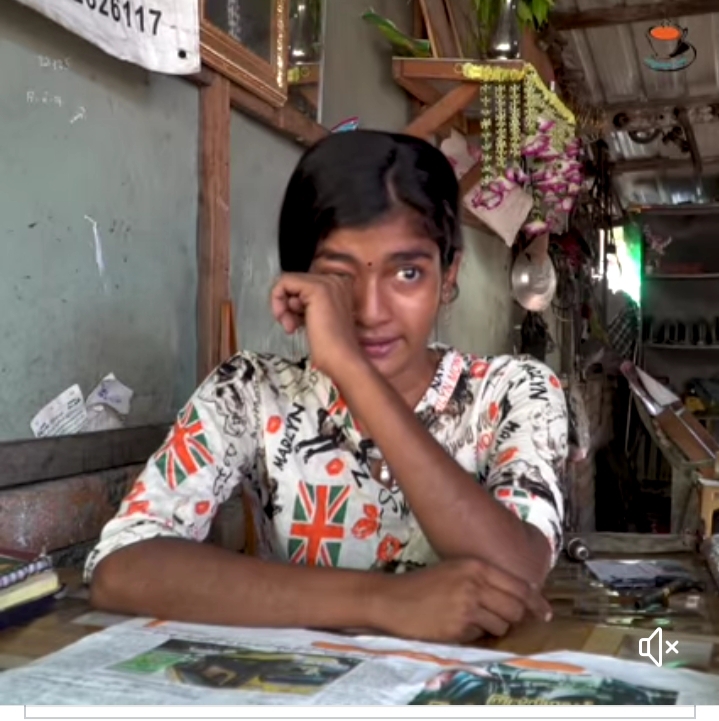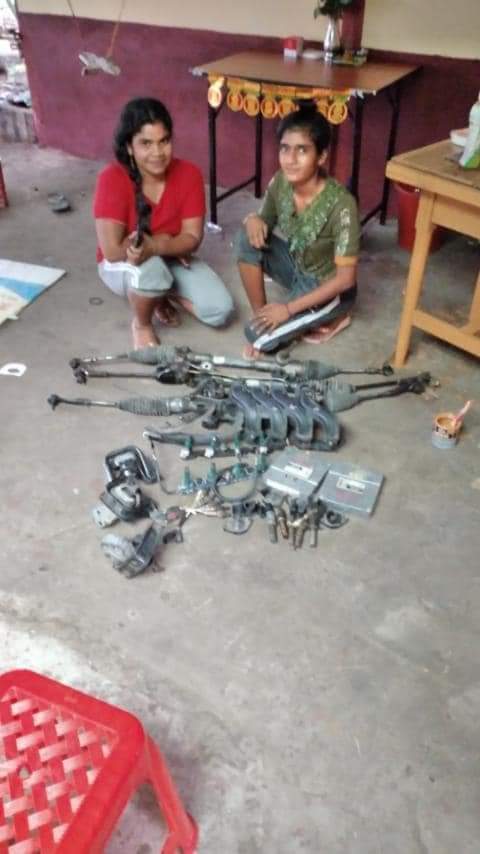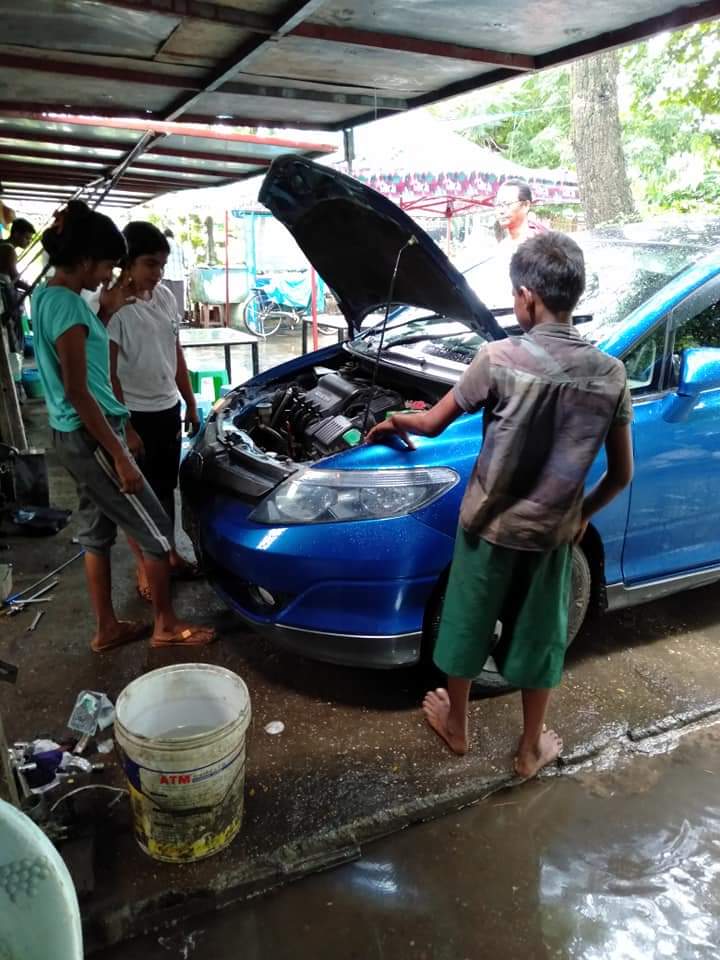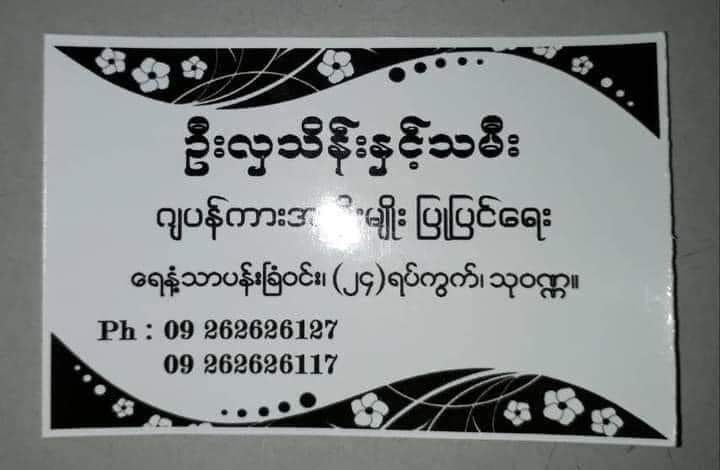The founder of Ingyin May Philanthropic Hindu Women’s Network

Lwin Lwin Mon
Introduction
In 2019, the Gender Equality Network (GEN) a civil society network from Myanmar selected Kathleen Thein as one of twenty women who are considered as role models for transforming Myanmar towards gender equality and democracy. She is a professional educator, community service volunteer and the founder of the Ingyin May Philanthropic Hindu Women’s Network. The association is named after the flower of the Bodhi Tree under which the Lord Buddha became enlightened.
One of the many aspects of her work to empower women is the participation in an inter-religious dialogue program. Shortly before the outbreak of the Covid-19 crisis, she attended a conference of the Coalition for Religious Equality and Inclusive Development (CREID) in Brighton, Great Britain and gave a talk on „Women’s Empowerment and Sustainable Development from the Hindu Women Perspective“. She can be regarded as being the face and mouth of Myanmar’s Hindu community.
Biography
Kathleen Thein was born in April 1962 in Yangon. She is the sixths daughter in the family among seven siblings. Her two elder brothers, one elder sister and one younger sister are professional doctors in USA, Canada and Myanmar. One of her elder brothers was a ship Captain and one of her elder sister is a retired auditor.

Theinbyu Street (Photo: H.-B. Zöllner)
Her father, U Thein Maung Shri Satyanandan, opened a small coffee powder shop in Yangon’s 51st street named Hanuman Coffee Powder shop in 1965. It is still being run for more than five decades with a good name. He was well known for his selfless dedication in the field of community work. He was the trustee at the several Hindu Temples, Former President of the All Burma Hindu Central Board for six years and a Patron of the organization for several years. Her father was very close with Former Prime Minister U Nu. During the time of the public uprising in 1988, former Prime Minister U Nu formed a parallel government and he became one of the ministers in it. Her father devoted his time for democratic change with that group and went through a lot of trouble as a consequence. Sadly, her father passed away in 1990 on the day of Myanmar elections that were won by the NLD. Her mother – Mrs. Shymala Devi – played a major part in the success of her family.
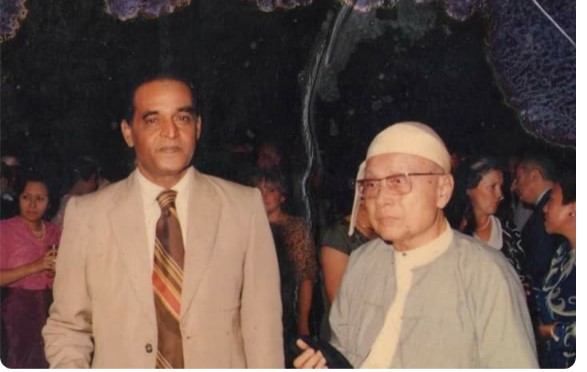

Kathleen Thein was very shy and timid when she was young. She grew up in an extended family with her siblings, cousins, aunties, uncles and grandparents. Her introvert personality was different from others. She finished her English Major degree in 1983 and joined as a part time tutor at the Yangon University English Department in 1984. She was very happy with her teaching career and since then her personality changed. She developed friendly relations with co-teachers, students and faculty members. Unfortunately, starting from 1988, the University was closed for several years. Her father wanted her to manage the Hanuman coffee powder shop. But she was not interested in managing a business and was only eager to teach English at the University.

She originally worked as an English specialization major tutor at Yangon University after universities opened again in 1992. Then, she was transferred to Sittwe University (Rakhine State) as a full-time tutor from 1996 to 1998. Here, she experienced that students from other religions liked her way of teaching. She further taught English as a Second Language (ESL) at several international schools – starting with a school set up by the Indian embassy – and became the principal of one of them. This way, she acquired a great amount of experience teaching English. Moreover, from 1997 on she was one of the core members of the English Language Teaching Contacts Scheme (ELTeCS), a program for local English teachers to improve their teaching expertise in English organized by the British Council. She made numerous presentations and workshops for English teachers in Myanmar, Thailand, Malaysia and Cambodia. In 2004, she was selected by the American Center as a participant of the TESOL convention in USA on behalf of Myanmar. TESOL is an international association of professionals who want to advance the quality of English language teaching. This experience of representing her country among teachers from all over the world „totally changed my life“ as she said later. She was now confident that she could „mingle with international educators“. Other travels to international conferences followed. In Myanmar, she became the co-chair of MmTESOL (English Teachers Association of Myanmar). Here, she conducted several English teachers’ upgrading workshops that were supported by the British Council.
It was the year 2008, in which her life took another turn. In May, Cyclone Nargis destroyed the Ayeyarwady Delta and killed more than 100.00 people which was answered by a steep increase in Myanmar NGOs. Sometime later, her mother died. Kathleen Thein decided to follow her father’s footsteps as a voice for the Hindu community. From this year on, she started to establish the Ingyin May Hindu Women Network, „Ingyin“ is regarded as as one of the national flowers of Burma known in India under the same name . She felt that she should try to change the pattern in Hindu society that men are the „god of the family and women have been left behind“ as she worded it.
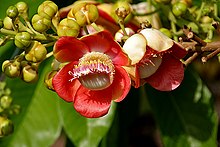
To establish a Hindu women organization however was not easy. Such an association existed already, she was told by an official when she submitted a letter asking for registration. She did not give up and after some time founded the Ingyin May Hindu Women Network together with a few other women. As a network it aimed at reaching out to all Hindu women with no regard to their around ten different Hindu „races“ represented by a Myanmar Hindu umbrella organization. She herself comes from a Tamil background. She stresses the independence of the organisation and stressed that she does not take funds from doners to prevent coming under the influence of others.
Since Hindu religion was the common thread of the organization, she became involved in the interfaith dialogue. Already in January 2008 the Interfaith Dialogue Group had been established in Myanmar to harmonize the diversity of Buddhist, Christian, Islam and Hindu people and work for a peaceful community. Thee various initiatives she started or supported since the establishment of the Women’s Hindu network thus aim not just at the improvement of the freedom of Hindu women but at the welfare of her country.
Some Notes on Myanmar’s Hindu Community
The Hindu community in Myanmar is rather small. According to the census of 2014, just 0.5% of the population were Hindus – even less than those who regarded themselves Animists (0.8%), the highest percentage counted in Bago Division (2,0% against just 1% in Yangon). This number has not change significantly over the last four decades, the census states. Most ancestors immigrated to Burma in the colonial period, some stem from Nepal. Before the second World War, they constituted a considerable part of Rangoon’s population. According to the census of 1931, from the 400,415 people living in Rangoon Town, 140,458 were „Indian Hindus“ against just 121,989 Burmese. The many Hindu temples built in the first half of the 20th century are still witness of the numerical strength of the Hindu population in the former capital.

It is generally assumed that Hinduism and Buddhism have the same roots as the name auf Kathleen Thein’s organization illustrates. In Hindu temples, statues of the Buddha can be seen.
As a result of today’s rather small Hindu community in Myanmar and its lack of public influence, Kathleen Thein as the most prominent Myanmar Hindu personality got involved in great number of issues to represent both her religion and the case of the Hindu women.
Social cohesion and peace process
While working at an International School in Yangon as a principal in 2012, a fierce conflict between Buddhists and Muslims broke out in Rakhine State that affected the religious harmony in the whole country and thus called for advocacy of the Interfaith Peace Dialogue Group including herself on behalf of the Hindu Women Network represented by her. She quit from the school and participated voluntarily in several peace organizations. U Aung Naing, one of the core members of the Interfaith Dialogue Group asked her to join that organization. She was being asked to talk about the Social cohesion and peace process in several townships on behalf of Interfaith Dialogue Group.
She also donated necessary things for the Hindu refugees from Yathe Taung, Buthi Taung and Maung Taw townships in northern Raklhine at the state capital Sittwe. The reason for Hindus becoming refugees was the conflict between Buddhists and Muslims in Rakhine. They were under pressure from the side of some terrorists in Rakhine who attacked the Hinu villages and killed Hindu men and women. So, some Hindu went for shelter in some refugee camp. Together with her family and friends, she collected some 5,000 dollars and went to Rakhine to comfort the refugees and distribute things that were needed. She went to the refugee’s camp alone for four times and donated needed things and comforted to Hindu women. They all were in a very difficult situation and suffered from traumata. Hindu women from conflict areas were crying on her shoulders as soon as they knew at she came to see them. Kathleen Thein gave them moral support. She felt that as if she was in different world when seeing the victims. Some of their husbands whad being killed. Children were so frightened.
Social cohesion and strengthening civil society
Besides speaking out against violence, she uses her skills as a teacher to motivate young people to get engaged strengthening social cohesion. In another interview she said: „I gave free English classes twice a year at monasteries, for religious and youth groups. I believe young people are ambassadors for our country. I gave them leadership skills”.
She further started to co-operate with Phan Tee Eain (Creative Home) NGO that focusses on gender equality and a Myanmar society in which diversity is respected and reports about the progress on women’s participation in elections.
In December 2018, she co-signed an open letter of more than 100 civil society groups to President U Win Myint in which it was complained that a civics education lesson taught in elementary schools includes discriminatory phrases such as, “Mixed blood is a hateful wrongdoing, and the race will be extinct.” In March 2019, the Education Ministry promised to stop teaching such lessons and she appreciated the ministry for that.

At a podium discussion on communal problems in September 2018, she stated: “I prefer prevention and collaboration than wasting a lot of time to find the complex root causes as I feel finding the causes means looking backward and we need to move forward leading peacefully by collaboration.” that „prevention and collaboration than wasting a lot of time to find the complex root caus She further noted that education in critical thinking must not be left to the informal sector but should be promoted in formal education as well.
Women’s empowerment and sustainable development
In her view. Asia women, especially Hindu Women from Myanmar are not familiar with the importance of women’s contribution to peace. Therefore, she is promoting this topic. Her favorite quote is “No Women, No Peace”.
One of her main tasks is that she has been trying to promote the women empowerment because Hindu women are not familiar with the concept of women empowerment. Moreover, she has been trying to stress the same rights of men and women in Hindu community. She reminds Hindu people that a new born girl was believed to signify the arrival of Laxmi, the goddess of wealth and riches.
Such mindset has however been replaced by customs in which men are regarded superior to women. Most of the men and women do not know about gender equality. That is why Kathleen Thein wants to show that all of the men and women have the same rights and dignity. In her childhood, her parents treated all the children, nieces and nephews the same. So that, since she was young, she never felt that men are superior to women. She always promote to Hindu family to educate daughters the same as sons because if the daughters are not given the proper education, they will not be able to make the right decisions.
Despite her activities, she is still struggling to break the „glass ceiling“ in the Hindu community because of so many customary barriers and inequality of gender mindset. But she never gives up doing the peace process.
Social work
Her compassion with the suffering of others was publicly highlighted in 2019. A 22 year old Buddhist boy had suffered an electric shock and lost his left arm. When she saw him in June of that year, she spontaneously promised to help him by an artificial substitute. She collected 7000 dollars from her friends and finally she arranged for him to fix a „robotic arm“ in January 2020.

During this pandemic period, she tried to collect donations from her relatives and friends from Myanmar and other overseas and supported to the donation money, food and other necessary things to Community Base Quarantine Centers and other needed persons. Most of her activities can get positive response by Hindus and also Non- Hindus in Myanmar. Recently, she also co-operated with WON (Women of Network) NGO and prayed for the Covid-19 patients free from Myanmar with multi- religions from women network.
Another example of her social work starting with the sad fate of an individual is the workshop project initiated by her. One day, Kathleen Thein was listing to an interview with a yooung Hindu lady in some social media. She was crying because she missed her father who had recently died and now had zo take over the responsibility of managing her father’s car workshop. Since she had been eight years old, she had been curious to learn from her father. Now she was 22 years and had to manage it.
Katheel Thein went to see and comfort her. Vis Facebook, she asked for donation and her friends from various religions donated some 6.000 dollars (9 million Kyats). With this money, it was possible to completely renovate the workshop during the present pandemic in just 10 days. Visiting friends provided necessary asecoires as well. Of course, the made the young lady and her family very happy.
Promoting religious harmony
Quite naturally, Kathleen Thein’s name became often mentioned in contexts of inter-religious affairs due to two factors. First, she had become the only prominent representative of Myanmar’s small Hindu Muslim community, second after the religious and communal conflicts between Buddhists and Muslims, the importance of interfaith dialogues was taken up both by civil society organizations and the government. After she had become the voice of Myanmar’s Hindu community, she became was invited to a great variety of meetings in Myanmar and later around the world.
Her first recorded participation in a prestigious event was the celebration of the 60th Anniversary of “The Five Principles of Peaceful Co-existence” in May 2014. The principles – non of them mentioning „religion“ – had been adopted on the initiative of China in June 1954 by the government of China, India and Burma and one year later was endorsed by the conference of non-aligned nations in Bandung, Indonesia. The event in 2014 was organised by the China-Myanmar Friendship Association. Some 500 persons attended. From the Myanmar side, a number of members of the Interfaith Dialogue Group gave speeches, among them Kathleen Thein.
Many other invitations and talks followed.
An exceptional highlight was her participation in a meeting called „The Interfaith Dialogue for Peace, Harmony and Security of the World“ that took place on August 5 and 6 in Yangon at the Yangon branch of the Sitagu International Buddhist Academy. It was jointly organized by the Sitagu International Buddhist Missionary Association, Myanmar, the Hindu Vivekananda International Foundation based in India, and the Myanmar Institute of Strategic and International Studies, the official Myanmar think-tank dealing with foreign affairs, in association with the Japan Foundation.

The prominence of the event was emphasized by video messages of the Prime Ministers of India and Japan. The meeting was attended by „spiritual masters“ of all world religions and 100 delegates from 30 countries. On the second day of the conference, Kathleen Thein gave a speech focusing on the role of women to teach the children about the principle of non-violence (ahimsa).[1]
This example shows that the question of „religion“ was always connected to the need to address current problems in a variety of fields, being it communal problems, gender issues or the promotion of education. As an activist striving for an all-embracing agenda, Kathleen Thein was invited to join various workshops, forums and panels in different countries all over the world. For example, on February 7 to 9, 2019 she had attended the forum about “The challenges to religious pluralism in Myanmar” as a panelist at Asian Institute of Technology in Thailand. Shortly later, she took part in 9th Meeting of the United Nation’s International Contact Group on Freedom of Religion or Belief (ICG-FoRB) in Geneva. Here – as elsewhere – she was the first female Hindo women taking part in such a meeting.
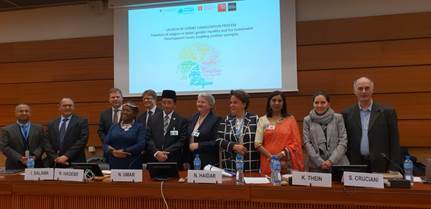
Assessment
Kathleen Thein distinguishes herself from most other Hindu fellow females in Myanmar by stepping beyond the traditional role model attributed to a woman. Her self-confidence is based on her capacity and talents as a teacher. Her dedication is rooted in the resolution to follow the footsteps of her father in his engagement for the common good. Her religious belief goes with compassion what helps to make her public speeches credible. As a well-known public figure, she benefits from her uniqueness as a decent representative of a small Myanmar community. It remains however to be seen if her activities will contribute to make her a role model for others. For sure, her mission is not yet accomplished.
[1] For her speech see https://www.youtube.com/watch?v=hlBX3SFMwGY (accessed 11.1.2021); for the whole program: http://samvad.vifindia.org/Agenda.html (accessed 11.1.2021).
References
- The World Buddhist Peace Conference, Sitagu International Buddhist Academy, Sagaing Hills, Sagaing, Myanmar, 22nd -24th Jan, 2016
- Kean, Thomas, The BC: A history through stories, Yangon, Myanmar, 2016
- The Interfaith Dialogue for Peace, Harmony and Security, Samvad-II, Collected Papers, 5th -6th August, 2017, Sitagu International Buddhist Missionary Association, Yangon, Myanmar
- Peace, Growing up and Development Journal, No.6, Published by Yadanmyay Social development Association, August, 2017
- World Learning Myanmar, Civil Society in Myanmar’s New Society. Conefrence Report May 2019. (Available under https://www.worldlearning.org/program/institute-for-political-and-civic-engagement-in-myanmar/)
- Transformative Women Leaders in Myanmar Society, Organized by Gender Equality Network, 2019
- Promoting Freedom of Religion or Belief and Gender Equality in the context of the Sustainable Development Goals: A Focus on Access to Justice, Education and Health, The Danish Institute for Human Rights, Reflections from the 2019 Expert Consultation Process, Denmark, March, 2020

